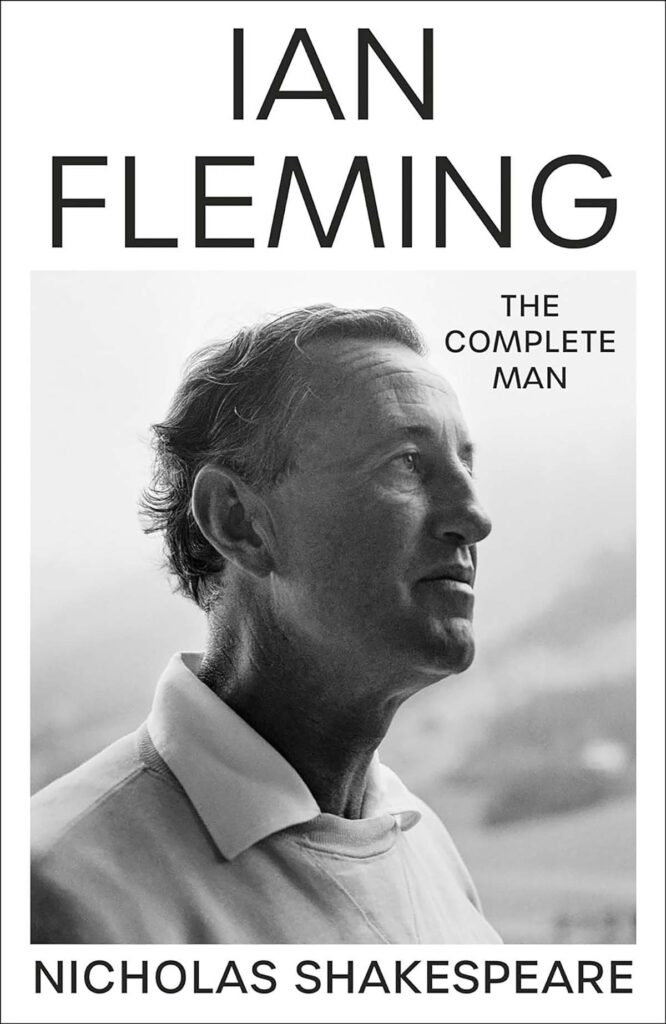Nicholas Shakespeare’s new biography of James Bond creator Ian Fleming is the first substantial work of its kind for a few decades. The author sets out to achieve exactly what the title suggests, offering his readers a thorough, meticulously-researched and richly-detailed account of an extraordinary life. ‘Ian Fleming: The Complete Man’ is neither hagiography nor an attempt to cancel or bury a Twentieth Century cultural icon who had his fair share of peccadillos. The subject is portrayed sympathetically but unflinchingly, character flaws and all. As such, the book is refreshing in the absence of attempts by the author to push contemporary agendas. Rather, the reader is taken on a journey through the tumultuous first seven decades of the last century which Ian Fleming helped to shape. The narrative covers Fleming’s childhood against a backdrop of the First World War and concludes in the 1970s, with the sad familial aftermath of Fleming’s early death in 1964.
‘Ian Fleming: The Complete Man’ is a scintillating read. It is never overly descriptive or bogged down by excessive detail. Fleming, a writer known for the economy of his prose, would have likely appreciated this approach. At 700 pages, it is a relatively long read, but the text is so endlessly fascinating that the pages are to savour and relish. Although he was dead at 56, Ian Fleming packed a lot in to his life and left an impressive legacy. Yet it wasn’t until he was in his 40s that he finally took to his typewriter and bashed out ‘Casino Royale’, the first of his James Bond novels. The prolific pace of one book per year followed until his death.
One of the most fascinating aspects of Shakespeare’s narrative is his exploration into why Fleming took so long to write his first book. After all, he was surrounded by literary figures for most of his life and counted Evelyn Waugh, the author of ‘Brideshead Revisited’, among his close friends. The distinction that Shakespeare picks up on is insightful: Waugh was the best and Fleming the most commercially successful author of their age. The character of Peter Fleming, Ian’s older brother, looms large in these pages. Although perfectly affable, the senior sibling achieves early literary success, rendering Ian the younger brother of a renowned author rather than a successful man in his own right. Breaking free from this shadow would take some self-belief. Shakespeare provides psychological insights into the internal battle that Fleming faced, using ideas from psychologists that Fleming himself favoured. Younger siblings caught in this scenario facing dominating or impressive elder siblings either compete or become fantasists. Although the success of the James Bond novels later ensured that Ian Fleming’s achievements completely eclipsed those of his brother’s, he nevertheless falls somewhere between the two stools of the psychological model.
Shakespeare also touches upon Fleming’s reticence to write novels. Spending his life among celebrated literary figures, Fleming knew that his own output, in terms of artistic merit, was not in the same league. Yet although his books were enormously popular, earning him immense wealth, his creation would take on a life of its own as a long-running and constantly evolving film franchise that would come to dominate in the public consciousness over the books.
Inescapably, James Bond is a hugely important part of the biography. As the character was only created in the final phase of Fleming’s life, it’s the closing two fifths of the biography that hone in on Bond. But the world’s most famous fictional spy hovers in the background for the first half too. Prior to Bond, Ian Fleming wasn’t idle or muddling his way through an ordinary life. Quite the contrary. The sections on his time during the war, a lot of which remains hush-hush, occupy a good chunk of the text and are jaw-dropping in what they expose. They reveal a man who had access to Winston Churchill and was dispatched to the other side of the Atlantic for meetings with Roosevelt’s top team. As a result, the CIA came to be formed. Fleming’s impressive wartime service was so secret that his contribution to the Allied victory remained unsung. But did this mean that Fleming could use his wartime experiences in his fiction? Is James Bond based upon the author himself?
Shakespeare tackles these questions with relish and presents his readers with a rounded portrait of a complicated man. There is a mercurial quality to Fleming. He was a man of inherent contradictions, and he meant different things to different people. Under Shakespeare’s guidance, though, the unknowable aspect of Fleming’s personality doesn’t confound readers or keep them at arm’s length from the subject. By the end of the book, I came away with an unparalleled insight into the mind of the man who invented James Bond.
As for the origins of the world’s most famous fictional spy – Shakespeare posits several theories. One compelling anecdote is that the name lodged in his head after a Lieutenant Rodney Bond saved his brother’s life during the war. Yet the first draft of ‘Casino Royale’ had a lead character called ‘James Secretan’. Doesn’t quite have the same ring to it, does it? Another suggestion is that his literary brother Peter came up with the idea. Although Fleming also had a book by the American ornithologist James Bond on his bookcase. Did he simply spot it and like the name?
Throughout the course of the book, Shakespeare uncovers myriad fascinating facts both about the origins of James Bond and the extraordinary life of his creator. There is insight into Fleming’s creative process and his reluctance to rewrite, preferring his method of forcing himself to work to a rigid timetable during certain times of the day and year. Against the backdrop of his late-in-life career as an author, there is also a late-in-life marriage and accompanying fatherhood. Shakespeare demonstrates through friends’ quotations that Fleming, even in failing health, hankered after his younger, more virile years, which came to be expressed through the ultimate fictional alpha male that he created.
There is so much to say about this remarkable and beautifully-written book that it’s almost impossible to condense into a review. Suffice it to say that every page contains a rewarding anecdote or revelation about the author. ‘Ian Fleming: The Complete Man’ is wholly successful at presenting a rounded portrait of the subject. Whereas most writers’ lives are less interesting than those of the characters they create, Fleming, as with so much else in his life, bucks the trend. The monumental effort in researching Fleming’s life pays off with a book that is enormously enjoyable and thrilling to read. ‘Ian Fleming: The Complete Man’ is heartily recommended for the James Bond fan in your life.

Publisher: Harvill Decker Publication date: 5th October 2023 Buy ‘Ian Fleming: The Complete Man’


